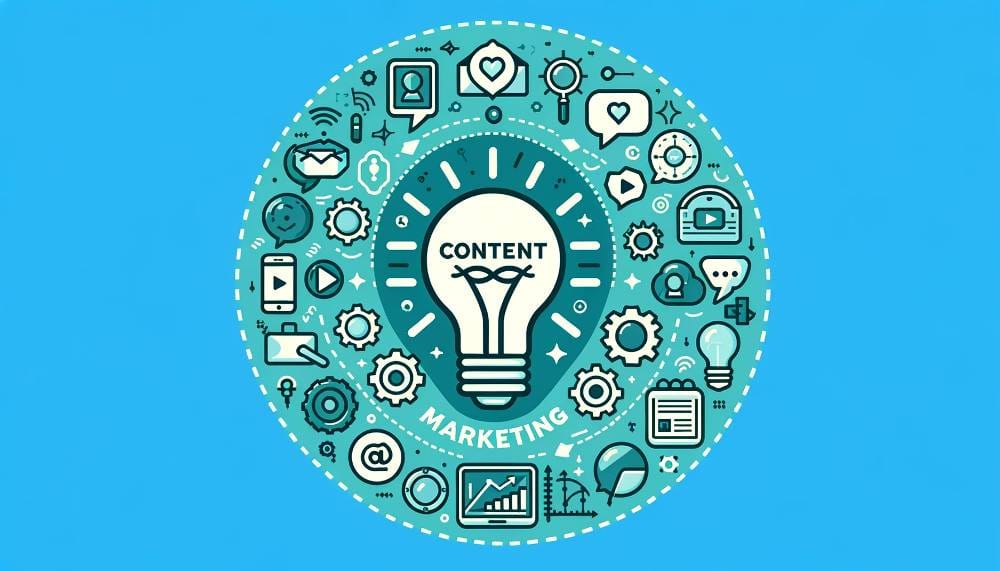Modern content marketing strategies beyond SEO
Explore how content marketing has evolved from SEO tactics to strategies focusing on audience engagement across multiple digital channels.

The kingdom of content marketing has undergone a significant revolution, transitioning from traditional SEO-centric strategies to a broader, more inclusive approach.
In the past, tools like Moz and Ahrefs were indispensable for identifying high-volume keywords around which content was crafted. This method was effective in enhancing search engine rankings and attracting organic traffic.
However, content marketing has evolved to become a strategic approach focused on creating and distributing valuable, relevant, and consistent content to attract and retain a specific audience. Its ultimate goal is to drive profitable customer action by offering content that is useful, entertaining, and inspiring.
Modern content marketing is characterized by its use of contemporary methods and techniques, including social media marketing, influencer marketing, email targeting, and more, all underpinned by technologies and data analytics. Unlike traditional marketing, which focused solely on content creation for SEO purposes, modern marketing strategies are designed to engage customers through a comprehensive spectrum of digital channels.
Content marketing now encompasses a wide range of formats, from insightful blog posts and dynamic videos to informative infographics and engaging podcasts. Each of these methods serves to connect with customers, offering value and ultimately achieving marketing goals. With a focus on consumer preferences and technological advancements, brands are no longer limited to a singular content strategy but are instead leveraging multiple channels to maintain their brand impact.

The path forward
Today, brands have access to a plethora of channels to showcase their content, including social media platforms, YouTube videos, and niche communities. According to a full-service Amazon agency, the rise of TikTok, Instagram, and other platforms has shown that a content-driven brand can thrive without a heavy reliance on traditional SEO efforts.
This paradigm shift towards modern content marketing emphasizes the quality and relevance of content over mere search engine rankings, aiming to maximize impressions and reach across various channels.
As content marketing continues to evolve, the distinction between SEO and content marketing becomes more pronounced. While SEO aims to improve visibility and rankings in search engine results pages (SERPs), content marketing focuses on providing valuable experiences to users regardless of search engine visibility. The integration of these strategies enables brands to craft comprehensive and successful marketing campaigns that cater to both search engines and human audiences.
Looking ahead, content marketing is set to further evolve, with voice search, artificial intelligence, and immersive technologies like AR and VR shaping the future of how content is created and consumed. The emphasis on targeted content for niche audiences, sustainability, and data privacy will guide brands in aligning with consumer expectations and values.

Key platforms for the future
As technology evolves, successful marketing increasingly relies on utilizing platforms that prioritize personalization, engagement, and transparency. These platforms are poised to shape the future of marketing:
1. Voice search optimization
With the convenience of hands-free searches, consumers are increasingly turning to voice commands to find information, shop online, and interact with the digital world. This shift necessitates a new approach in content creation and SEO strategies, focusing on natural language processing and question-based queries.
Brands that adapt to voice search optimization will capture a significant portion of voice-based traffic, making it crucial for marketers to integrate conversational keywords and phrases into their content to align with the way people naturally speak.
Examples: Google Assistant, Amazon Alexa
2. Augmented reality (AR) and virtual reality (VR)
AR allows users to visualize products in their own environment before making a purchase, thus bridging the gap between online shopping and the tactile experience of traditional retail. VR, on the other hand, transports users to entirely virtual worlds, providing an unparalleled depth of engagement.
These technologies enable brands to create compelling narratives and experiences that not only captivate attention but also foster emotional connections with their audience. As hardware becomes more accessible and content creation tools evolve, AR and VR will offer innovative ways for marketers to showcase products, educate consumers, and create memorable brand experiences that stand out in a crowded digital marketplace.
Examples: IKEA Place, Oculus
3. Artificial intelligence (AI) powered platforms
AI-powered platforms can analyze vast amounts of data to identify patterns, predict consumer behavior, and deliver personalized content and recommendations in real-time. This level of customization enhances the consumer experience, increases engagement, and drives conversions.
Furthermore, AI can automate repetitive tasks, optimize ad campaigns, and provide insightful analytics, allowing marketers to allocate their resources more efficiently and focus on creative strategy.
Examples: ChatGPT, Salesforce Einstein
4. Social media platforms with e-commerce capabilities
With the introduction of features like shoppable posts, in-app purchases, and augmented reality try-ons, social media is making it easier for consumers to discover and buy products directly within the platform.
This seamless integration of social media and e-commerce capitalizes on impulse buying and the power of social influence, significantly shortening the consumer's journey from discovery to purchase.
Examples: Tiktok, Instagram, Facebook, Pinterest
5. Blockchain technology for marketing
By facilitating secure, transparent transactions and data exchanges, blockchain can significantly reduce fraud, ensure the authenticity of products, and protect consumer privacy. For marketers, blockchain opens up new avenues for loyalty programs, where tokens can be used to reward customer engagement in a transparent and tamper-proof system.
Additionally, blockchain can revolutionize influencer marketing by verifying the authenticity of followers and engagements, ensuring that marketing budgets are spent on genuine interactions.
Examples: Brave, IBM Blockchain
As these platforms continue to evolve and integrate into our daily lives, the future of marketing is set to become more interactive, personalized, and transparent.
ContentGrow is a managed talent network for brands and publishers to work with high-quality freelance writers and journalists worldwide. Sign up to get started or book a discovery call to learn more.





